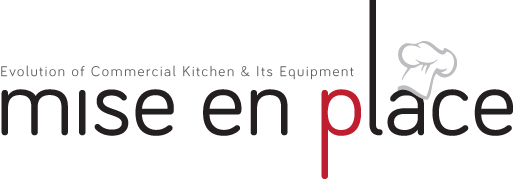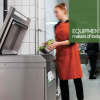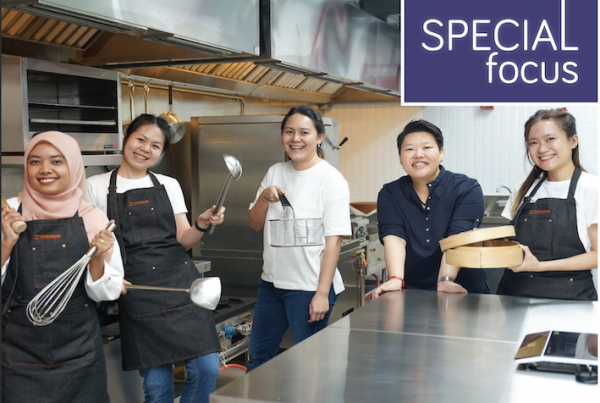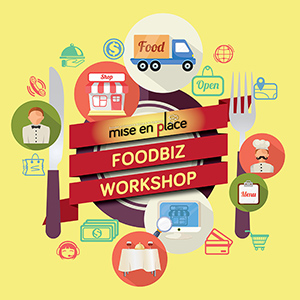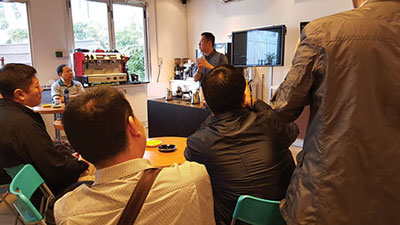 No matter who we met in the business of coffee knowledge, they were all united in saying that learning never stops. One of the most valuable and oldest commodities in the world, it is one that continues to intrigue with multiple personas and characteristics that can be altered depending on where they are and how they are handled. The varied facets of the bean has led to institutions being built around it; to study everything about making a good cup of coffee – from the farm to the cup as often quoted. We speak to some organisations who are dedicated to imparting these knowledge and how to make coffee a
No matter who we met in the business of coffee knowledge, they were all united in saying that learning never stops. One of the most valuable and oldest commodities in the world, it is one that continues to intrigue with multiple personas and characteristics that can be altered depending on where they are and how they are handled. The varied facets of the bean has led to institutions being built around it; to study everything about making a good cup of coffee – from the farm to the cup as often quoted. We speak to some organisations who are dedicated to imparting these knowledge and how to make coffee a
sustainable business venture.
GETTING SCHOOLED AT SCHOOL OF COFFEE
300 – 400 outlets in Singapore and still growing. Coffee today is no longer just a cup in the morning but is enjoyed throughout the day. For many, this translates to ample opportunities but like every business, it comes with pitfalls. Small or big, cafes are opening and closing somewhere and it is now very important to have done ample preparation before going into one.
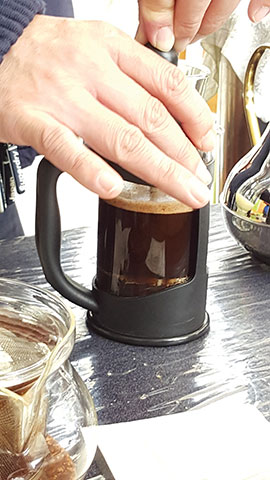 And it is a place like School of Coffee, where you can start learning the insides and outs of starting your own café. Started in 2010 at Singapore Polytechnic with Kaffee Kultur, an artisan coffee roasting company ; the School is set up to bring gourmet coffee drinking culture to the next generation. It starts right from the beginning – beans, roasting process, education of coffee, business aspect of running a café and of course, barista training. Tony Tang, CEO of Kaffee Kultur has this to share ; “as an owner, there is no shortcut to owning a café and be successful. You must be trained as a Barista and continue to hone your skill. Star ting a café doesn’t end with barista training.In a market like Singapore, where costs of startup is higher than many other markets, it is important to be creative yet have the consistency as you change with the trends!”
And it is a place like School of Coffee, where you can start learning the insides and outs of starting your own café. Started in 2010 at Singapore Polytechnic with Kaffee Kultur, an artisan coffee roasting company ; the School is set up to bring gourmet coffee drinking culture to the next generation. It starts right from the beginning – beans, roasting process, education of coffee, business aspect of running a café and of course, barista training. Tony Tang, CEO of Kaffee Kultur has this to share ; “as an owner, there is no shortcut to owning a café and be successful. You must be trained as a Barista and continue to hone your skill. Star ting a café doesn’t end with barista training.In a market like Singapore, where costs of startup is higher than many other markets, it is important to be creative yet have the consistency as you change with the trends!”
School of Coffee understands this and provides students with a variety of classes-from coffee appreciation, beverage crafting, single origin tasting, coffee art exploration and most definitely a beginner and advance barista training. With a facility built in Singapore Polytechnic, the School of Coffee has an array of coffee machines on site for trial and students graduate with a certificate recognised by the Professional & Adult Continuing Education (PACE) Academy of Singapore Polytechnic.
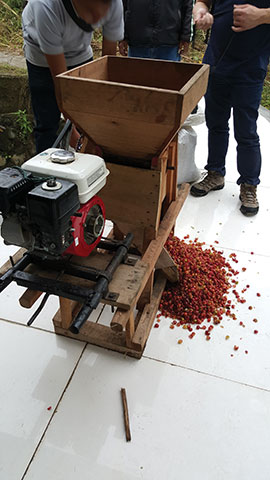 When you are ready to start up your own business, the School is here to support you with its cafe consultation sessions that highlight uncertainties and the many challenges in setting up shop. After that, it provides a Turn-key Café Set-up Service that encompasses supply of beverage powders, barista training courses to equip cafe staff, consulting ser vices during the setting up and
When you are ready to start up your own business, the School is here to support you with its cafe consultation sessions that highlight uncertainties and the many challenges in setting up shop. After that, it provides a Turn-key Café Set-up Service that encompasses supply of beverage powders, barista training courses to equip cafe staff, consulting ser vices during the setting up and
free installation for espresso machines purchased from it. For a comprehensive solution, it also assists individual establishments to customise their own coffee blend that showcases their identity.
So we asked Tony what is the best attraction for a café and his advice for new and aspiring operators? “As people get more educated (more and more serious drinkers are attending coffee appreciation courses), a café owner needs to be more sensitive. Make sure that you serve fresh quality coffee. Make sure your suppliers work with you and know your market well. And you have to be in the business – not just invest and expect it to thrive. Learn as much as you can and never take things for granted”.
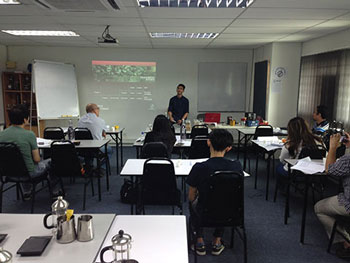 AN INDUCTION INTO BARISTA GUILD ASIA
AN INDUCTION INTO BARISTA GUILD ASIA
“With the right technique and know-how of the product, I can still make a good cup of coffee using beans that aren’t necessarily the best”; said Daniel Liew, Academic Director of Barista Guild Asia (BGA). This is an impor tant point to note as most Malaysians aren’t exceptionally picky of the coffee nor would they pay for the specialty grade coffee (80-90%) thus most cafes here use coffee beans graded at 70-80% to commesurate with the audience’s spending power. Thus, it is clear to see that people makes your cafe; not the barista’s knowledge and insistence on the ‘best’ coffee in their opinion. The insight is one of the reasons why Daniel started Barista Guild Asia which was a pioneer in coffee-related education in Malaysia and is still the most trusted school with 30% of the total baristas in the country having graduated from here.
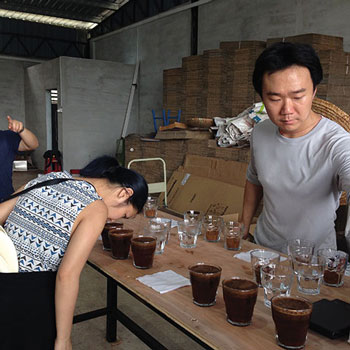 Should cafe owners hire a barista who is cer tified? Daniel thoughtfully asks; while many are certified, how many are certifiable? Are they able to see the bigger picture beyond pulling shots and latte art and look into the business as a whole? This is why BGA runs classes that combine coffee knowledge, barista skills and business operations. According to Daniel, cafe operations should ideally start with good resources and the owner has to get down to understand price points for commercial and premium coffee. The coffee supply chain can be a complicated one and if you are not knowledgable, you might get the short end of the stick with some unscrupulous dealers. Therefore, your learning begins by identifying the characteristics of a good bean and looking for defects as even one tiny portion that is burnt on a bean can affect the eventual drink. At the end of the 3-day barista workshop, one would be given 3 months to practice with BGA’s trainers. The extended timeline is to enable trainees to be familiar with everyday operations as Daniel said, “exam is not about passing but its about knowing the routine until it becomes so natural to you”. Therefore, trainees are tested based on industry expectations where they are to prepare a range of coffee beverages in 20 minutes and are not only graded on taste but on workflow and bar management as well – all which closely mirrors real barista life.
Should cafe owners hire a barista who is cer tified? Daniel thoughtfully asks; while many are certified, how many are certifiable? Are they able to see the bigger picture beyond pulling shots and latte art and look into the business as a whole? This is why BGA runs classes that combine coffee knowledge, barista skills and business operations. According to Daniel, cafe operations should ideally start with good resources and the owner has to get down to understand price points for commercial and premium coffee. The coffee supply chain can be a complicated one and if you are not knowledgable, you might get the short end of the stick with some unscrupulous dealers. Therefore, your learning begins by identifying the characteristics of a good bean and looking for defects as even one tiny portion that is burnt on a bean can affect the eventual drink. At the end of the 3-day barista workshop, one would be given 3 months to practice with BGA’s trainers. The extended timeline is to enable trainees to be familiar with everyday operations as Daniel said, “exam is not about passing but its about knowing the routine until it becomes so natural to you”. Therefore, trainees are tested based on industry expectations where they are to prepare a range of coffee beverages in 20 minutes and are not only graded on taste but on workflow and bar management as well – all which closely mirrors real barista life.
On top of running the full course outlined by Specialty Coffee Association of Europe, the guild runs cafe management workshops covering business consultation on issues of staffing, developing and/or reviewing your business plan, concept inventory, control and marketing strategies. To complete your fundamentals in coffee knowledge and business, you can take up the equipment maintenance course. While BGA provides consultation, it does not endorse any brand over others as the institute is not affliated to any equipment manufacturers or coffee suppliers.
www.facebook.com/baristaguildasia
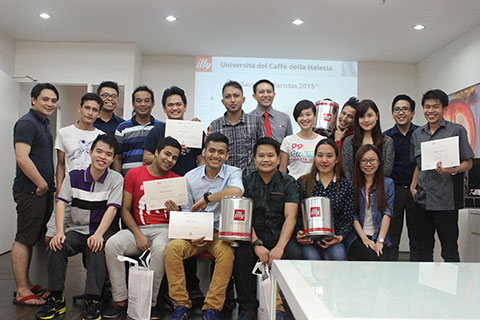 UNIVERSITÀ DEL CAFFÈ – FROM ITALY TO THE WORLD
UNIVERSITÀ DEL CAFFÈ – FROM ITALY TO THE WORLD
Who in the coffee world hasn’t heard of illy? Its company founder, Francesco Illy developed the modern espresso machine in 1933 and is now present in 140 countries worldwide. Building on its wealth of knowledge and desire to share the wonders of coffee, the Università del Caffè (UDC) was established in 1999. In less than 20 years , it has opened more than 20 centres worldwide, making available a hub for entrepreneurs, professionals and hobbyists alike to meet, learn and exchange ideas about the drink. We caught up with Goh CW, Coffee Consultant and teacher at UDC Malaysia to learn more about the work of the university. Of course, the basic barista class is necessary to follow the bean on its journey from countries of origin, how to prepare the perfect espresso and cappucino though the synergy of understanding beans’ characteristics and calibration of equipment. Its Coffee Expert course is tailored for participants who haveexplored basic barista and want to take the professional route. Both theoretical and practical lessons will be taught with subjects covering histor y, habits and customs, physiology, botany and basic cupping theory.
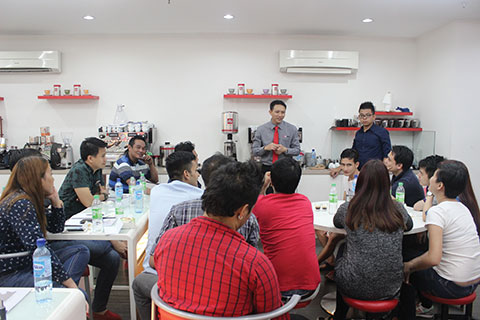 Although Goh has been in the industry for more than 10 years, he says that baristas must always have an open mind and for cafe owners; it would be great to pick up these knowledge although you may not be the one behind the bar. Baristas should come with a mentality that ever y process in making coffee matters to their learning experience; and that includes washing the cups! To fur ther enhance one’s skill, UDC created a Master Barista course which is held once a year with champions of World Barista Championship sharing with participants in some classes over 3 days. On the business side, UDC works with its illy coffee distributor, Classic Coffee & Beverage, to consult entrepreneurs on beverage management for its cafe. It is important to cater to non-coffee drinkers and businesses should be more innovative, said Goh, adding that iced teas is an upcoming trend and the team is constantly doing R&D to propose new tastes with Western teas and local ingredients.
Although Goh has been in the industry for more than 10 years, he says that baristas must always have an open mind and for cafe owners; it would be great to pick up these knowledge although you may not be the one behind the bar. Baristas should come with a mentality that ever y process in making coffee matters to their learning experience; and that includes washing the cups! To fur ther enhance one’s skill, UDC created a Master Barista course which is held once a year with champions of World Barista Championship sharing with participants in some classes over 3 days. On the business side, UDC works with its illy coffee distributor, Classic Coffee & Beverage, to consult entrepreneurs on beverage management for its cafe. It is important to cater to non-coffee drinkers and businesses should be more innovative, said Goh, adding that iced teas is an upcoming trend and the team is constantly doing R&D to propose new tastes with Western teas and local ingredients.
Although its named a university, UDC welcomes all coffee lovers hence the Coffee Appreciation workshop is dedicated to teaching on the different types of beans and its origin alongside the experience of trying out professional coffee machines. From nature to science, via the art of preparation and tasting, coffee is explained, illustrated and taught in a course complete with sensorial stimuli. After knowing how to pull a shot, there’s an option to follow up with Latte Art and learn hands-on the principles of the art, milk texturing to pouring techniques.
www.udcmalaysia.com.my
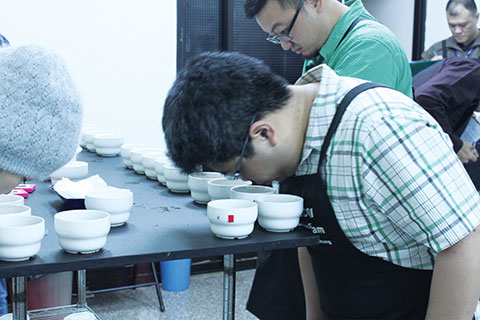 LICENSED TO GRADE COFFEE AT Q CUP TEACHING LAB
LICENSED TO GRADE COFFEE AT Q CUP TEACHING LAB
Grading specialty coffee to be exact. But what is specialty coffee and how is it recognised? While the industry generally accepts the Specialty Coffee Association of America‘s (SCAA) recognition of coffee scoring 80 points or above out of 100 points as ‘specialty’ ; founder of Q Cup Teaching Labs, T.Y. Yu says there are various definitions according to the regional associations. As for Q Cup, it adopts the Coffee Quality Institute®’s (CQI) Q Coffee System . The system aims to locate specialty coffees at its origin and improve those that can potentially achieve the specialty standards. Green coffee samples are first submitted to an In-Country Partner (ICP) where 3 Licensed Q Graders (professionally accredited cuppers) cup and score the coffee. Should it meet the standards for green, roasted and cup quality, it is certified as a Q CoffeeTMwhich is an independent confirmation of quality that can truly be deemed specialty. A technical report will be provided if the coffee fails to meet the standards. The Q Coffee System opens an avenue where buyers and sellers are on the same page about specialty coffee at the same time creates an infrastructure for producers to gain better oppor tunities into the marketplace and improve their economy.
Q Cup Teaching Lab is Malaysia’s first company licensed to run the Q Grader combo training and exam which is a six-day course comprising three days of examination that tests an intensive 22 sections on coffee related topics such as green grading, roast identification, coffee cupping, sensor y skills and sensor y triangulation. Professionals from the Coffee Quality Institute will grade participants on whether they can join over 4,000 individuals worldwide authorised to use the Q logo and the nomenclature “Licensed Q Grader”as a professional accreditation.
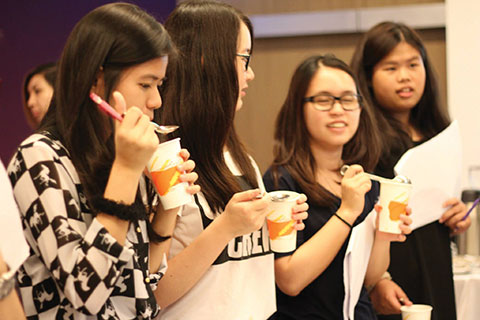 Other certificates the lab offers include the SCAA Certified Golden Cup Technician which looks into an expert understanding of the SCAA Brewing Standards and six essential elements of goodbrewing. Certified individuals are able to conduct on-site inspections as par t of the Golden Cup Award program. Meanwhile the Roasters Guild of America Certificate Level 1 is a course that covers understandingthe seed, roasting concepts and how-tos, green coffee grading, to Green Coffee contracts and students have to complete a 100-hour roast log. Individuals can also take the SCAA Level 1 certificate to pick up the introduction to espresso, cupping, coffee brewing & extraction, customer service before taking the Level 1 Barista Certificate Test. Other self-designed workshops include latte art, basic brewing, cupping, introduction to roasting, specialty coffee barista skill building and barista training.
Other certificates the lab offers include the SCAA Certified Golden Cup Technician which looks into an expert understanding of the SCAA Brewing Standards and six essential elements of goodbrewing. Certified individuals are able to conduct on-site inspections as par t of the Golden Cup Award program. Meanwhile the Roasters Guild of America Certificate Level 1 is a course that covers understandingthe seed, roasting concepts and how-tos, green coffee grading, to Green Coffee contracts and students have to complete a 100-hour roast log. Individuals can also take the SCAA Level 1 certificate to pick up the introduction to espresso, cupping, coffee brewing & extraction, customer service before taking the Level 1 Barista Certificate Test. Other self-designed workshops include latte art, basic brewing, cupping, introduction to roasting, specialty coffee barista skill building and barista training.
www.qcup.com.my
 NEW SIGHTS ON COFFEE & TEA WITH MACaTI
NEW SIGHTS ON COFFEE & TEA WITH MACaTI
What about using green tea to cook a local Malay dish? Or an assam tea risotto? That is what Malaysian Association of Coffee and Tea Innovation aims to do – challenge the industry to add some revolution with two of the most prominent beverages of the world. One of its approaches is organising events such as its recent Kitchen Confidential where par ticipants were tasked to infuse coffee and tea in their competing dishes while The Rivalwas a Charity Boxing Ball to contribute to the society and feature coffee and tea innovations in the market. President Bernard Reincastle, with 37 years in the food and beverage industry started the movement because he saw there is still much potential to develop and grow the Coffee and Tea industries in Malaysia. If you were a barista, what you want to tell customers is “do you want your regular coffee?”; he opined. That is a definite display of satisfaction but often many fall by the wayside due to poor business aptitude.
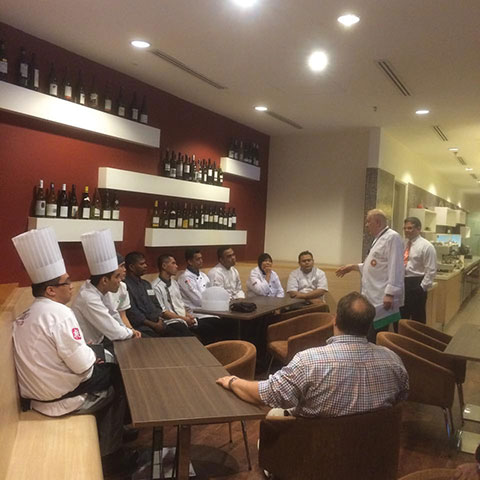 Although on its own, it does not run SCAA or SCAE courses, it is currently working with BERJAYA University College of Hospitality to conduct a Professional Certificate in Baristacourse which is fully funded by the Malaysian government. Individuals will learn how to run a cafe / coffee kiosk with minimal super vision through lessons of coffee understanding, brewing methods and menu engineering. With understanding, one can then apply the fundamentals and innovate to bring more excitement to the beverage segment but aside from exciting flavours; MACaTI believes that management training must not be neglected. On its own accord, it has pulled together resources to teach topics on customer service excellence, human resource management, leadership, critical thinking and creative problem solving, basic accounting, food handling and safety as well as comprehension of stock control. Further into its aim of cultivating sustainable business ownership, the association plans to have its own coffee plantation and also set up a franchising program where potential owners operate a cafe on a tried-and-tested ecosystem.
Although on its own, it does not run SCAA or SCAE courses, it is currently working with BERJAYA University College of Hospitality to conduct a Professional Certificate in Baristacourse which is fully funded by the Malaysian government. Individuals will learn how to run a cafe / coffee kiosk with minimal super vision through lessons of coffee understanding, brewing methods and menu engineering. With understanding, one can then apply the fundamentals and innovate to bring more excitement to the beverage segment but aside from exciting flavours; MACaTI believes that management training must not be neglected. On its own accord, it has pulled together resources to teach topics on customer service excellence, human resource management, leadership, critical thinking and creative problem solving, basic accounting, food handling and safety as well as comprehension of stock control. Further into its aim of cultivating sustainable business ownership, the association plans to have its own coffee plantation and also set up a franchising program where potential owners operate a cafe on a tried-and-tested ecosystem.
www.macati.com.my
These associations undoubtedly play an important role in bringing up the standards of coffee education, barista competency and how to work out these knowledge into the competitive landscape of foodservice. And we can safely say that coffee (and tea) never goes out of style with people constantly reinventing and finding ways to enjoy the beverage.
